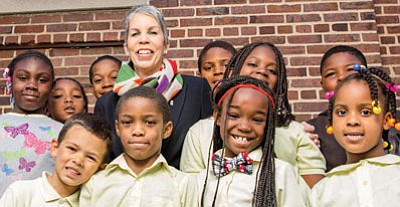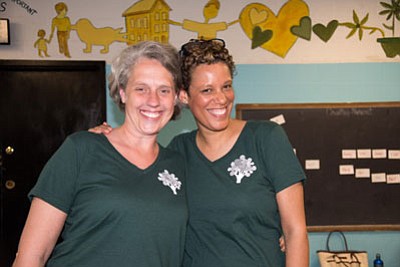The daughter of a longtime Baltimore educator, Bronwyn Mayden, MSW has a special connection to the Upton/Druid Heights community.
Courtesy Photo
Bronwyn Mayden, MSW, serves as executive director of Promise Heights, an initiative led by the University of Maryland Baltimore’s (UMB) School of Social Work (SSW). Money from the implementation grant will be used to bring additional supports to Eutaw-Marshburn Elementary School; Furman L. Templeton Preparatory Academy; The Historic Samuel Coleridge-Taylor Elementary; Booker T. Washington Middle School for the Arts; and Renaissance Academy High School.
“I am a child of a Baltimore City Public School teacher, a product of Baltimore City Public Schools, and my family grew up in that neighborhood,” said Mayden, who serves as executive director of Promise Heights, an initiative led by the University of Maryland Baltimore’s (UMB) School of Social Work (SSW).
Through the efforts of Mayden and others, her old community is getting needed help in a major way. The U.S. Department of Education has awarded Promise Heights a five-year, $30 million grant to continue its effort to improve the lives of children and families in the West Baltimore neighborhood of Upton/Druid Heights.
The grant award was announced by the Department of Education as part of the Promise Neighborhoods Implementation Grants Program. This is one of 24 Promise Neighborhood implementation awards announced since 2011, the only one in Maryland, and the only one hosted by a school of social work. Promise Neighborhoods support schools in high-poverty communities to become vibrant centers of opportunity and excellence.
UMB’s schools of medicine, nursing, dentistry, and pharmacy also participate in the initiative in Upton/Druid Heights, a neighborhood near UMB that includes parts of historic Pennsylvania Avenue and extends as far south as Martin Luther King Jr. Boulevard and Eutaw Place to the east.
Courtesy Photo
L-r: Kyla Liggett-Creel, LCSW-C, PhD, and Henriette Taylor, MSW, LGSW, celebrate a successful graduation ceremony for “Parent University,” a Promise Heights program
“Yes, we do theory and practice with students, but felt UMB could do more in the city,” said Mayden who is also an assistant dean at UMB. “We have been working for almost ten years in the Upton/Druid Heights area in Baltimore. When we first started, we decided we needed to do more in the community. When I looked at the demographics, I looked at the neighborhoods closest to the school, and the Upton/Druid Heights neighborhood stood out to me. As a university, we realized we needed to step up.”
She added, “We really studied what was going on, and talked to a lot of people. We came to realize the problems in the neighborhood were so great, that no one organization could work on them. It had to be partners working together to achieve common goals. Those goals included ensuring that children in the neighborhood were in school, that they be proficient in reading and math, be ready to graduate and go on to college, and ultimately a career. That was the theme of what we were doing.”
Partners include neighborhood resident associations; Office of the Mayor; Maryland State Department of Education; Baltimore City Public Schools; Family League of Baltimore; and United Way of Central Maryland.
According to Mayden, the implementation grant enables Promise Heights to continue its comprehensive plan for combating poverty and increasing academic achievement in the local community. The grant builds on the $500,000 planning grant awarded to Promise Heights in 2013, which generated the capacity to deliver and evaluate a full array of evidence-based services.
“A team of us worked on this $30 million grant,” said Mayden. “It was a lot of hard work and the process was highly-competitive. We were over the moon when we found out we had won.”
Money from the implementation grant will be used to bring additional supports to the five Baltimore City Public Schools in Upton/Druid Heights, such as: early childhood mental health consultation; social-emotional support; academic support and enrichment; and college and career coaching to ensure pathways out of poverty for youth and their families.
Targeted schools in the neighborhood include: Eutaw-Marshburn Elementary School; Furman L. Templeton Preparatory Academy; The Historic Samuel Coleridge-Taylor Elementary; Booker T. Washington Middle School for the Arts; and Renaissance Academy High School.
“We want to turn these five schools into stellar schools,” said Mayden. “We want to see them turn around and show that with the right support, these children can achieve just as much as privileged children can achieve.”
Mayden also praised the efforts of the Rev. Dr. Al Hathaway, who is intricately involved with Promise Heights. Like Mayden, Pastor Hathaway has ties to the Upton/Druid Heights community. He is pastor of Union Baptist Church located at 1201 Druid Hill Avenue and grew up in the 2000 block of Druid Hill Avenue.
“Nothing happens without struggle,” said Pastor Hathaway. “We stayed the course and collectively used our resources. We are talking about an extra six million dollars a year for schools in the Upton/Druid Heights community. I think it will be an amazing opportunity.”
For more information about Promise Heights, visit www.promiseheights.org


